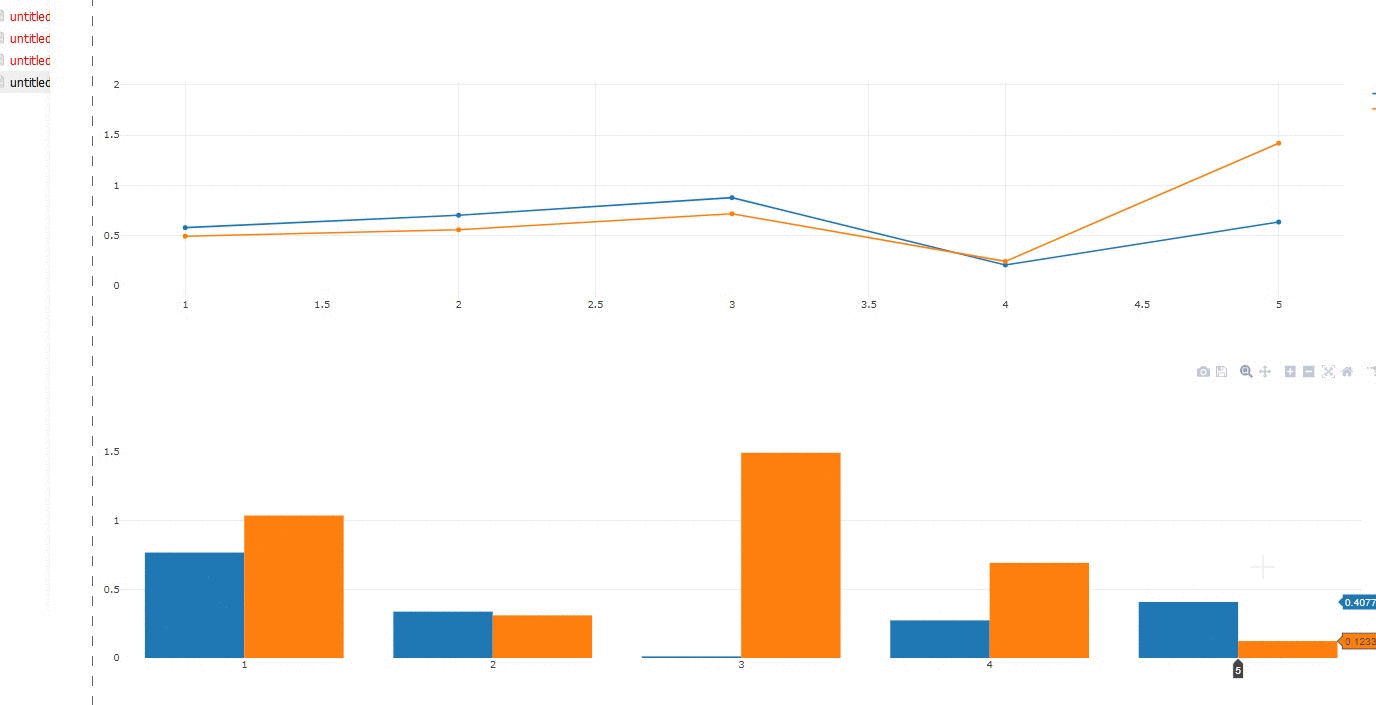Live updating only the data in Dash/plotly
I want to monitor some live data and allow the user to select their own ranges when interacting with the plots. I created this small example (got it from the tutorial) and the problem is, every time I update the plot, everything gets reset since update_graph_live() returns a new Plotly figure. (see example below)
Is it possible to update just the data, so the figure is not reloaded and reset to the default view/settings? I was using d3.js before and sent the data through websockets, so I could filter the data in the browser. But I would like to do it with Dash directly.
import dash
from dash.dependencies import Output, Event
import dash_core_components as dcc
import dash_html_components as html
from random import random
import plotly
app = dash.Dash(__name__)
app.layout = html.Div(
html.Div([
html.H4('Example'),
dcc.Graph(id='live-update-graph'),
dcc.Interval(
id='interval-component',
interval=1*1000
)
])
)
@app.callback(Output('live-update-graph', 'figure'),
events=[Event('interval-component', 'interval')])
def update_graph_live():
fig = plotly.tools.make_subplots(rows=2, cols=1, vertical_spacing=0.2)
fig['layout']['margin'] = {
'l': 30, 'r': 10, 'b': 30, 't': 10
}
fig['layout']['legend'] = {'x': 0, 'y': 1, 'xanchor': 'left'}
fig.append_trace({
'x': [1, 2, 3, 4, 5],
'y': [random() for i in range(5)],
'name': 'Foo',
'mode': 'lines+markers',
'type': 'scatter'
}, 1, 1)
fig.append_trace({
'x': [1, 2, 3, 4, 5],
'y': [random() for i in range(5)],
'name': 'Bar',
'type': 'bar'
}, 2, 1)
return fig
if __name__ == '__main__':
app.run_server(debug=True)
Answer
If you add animate=True to your dcc.Graph the toggled traces and selected zoom/marker/whatever is kept but this does not work for bar plots (although it should work: https://github.com/plotly/plotly.js/pull/1143). In addition, instead of returning the complete figure, you would need to just return the traces.
Best possible solution I could come up is to split it into two graphs but you would get at least most of the desired functionality.
import dash
from dash.dependencies import Output, Event
import dash_core_components as dcc
import dash_html_components as html
from random import random
import plotly
app = dash.Dash(__name__)
app.layout = html.Div(
html.Div([
dcc.Graph(id='live-update-graph-scatter', animate=True),
dcc.Graph(id='live-update-graph-bar'),
dcc.Interval(
id='interval-component',
interval=1*1000
)
])
)
@app.callback(Output('live-update-graph-scatter', 'figure'),
events=[Event('interval-component', 'interval')])
def update_graph_scatter():
traces = list()
for t in range(2):
traces.append(plotly.graph_objs.Scatter(
x=[1, 2, 3, 4, 5],
y=[(t + 1) * random() for i in range(5)],
name='Scatter {}'.format(t),
mode= 'lines+markers'
))
return {'data': traces}
@app.callback(Output('live-update-graph-bar', 'figure'),
events=[Event('interval-component', 'interval')])
def update_graph_bar():
traces = list()
for t in range(2):
traces.append(plotly.graph_objs.Bar(
x=[1, 2, 3, 4, 5],
y=[(t + 1) * random() for i in range(5)],
name='Bar {}'.format(t)
))
layout = plotly.graph_objs.Layout(
barmode='group'
)
return {'data': traces, 'layout': layout}
if __name__ == '__main__':
app.run_server(debug=True)

